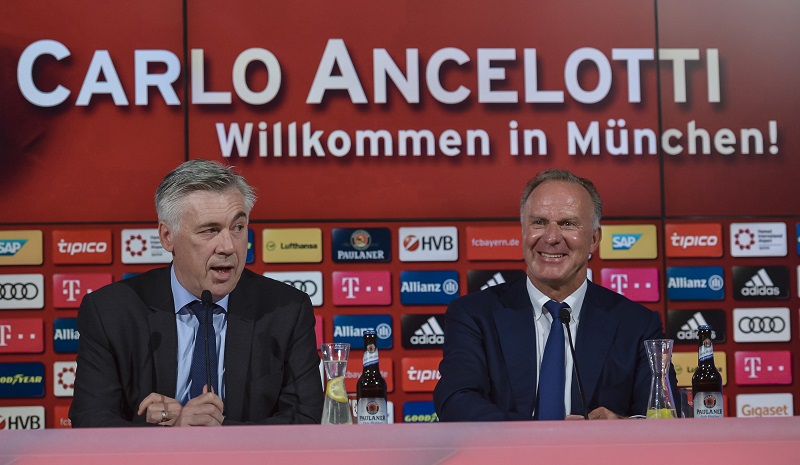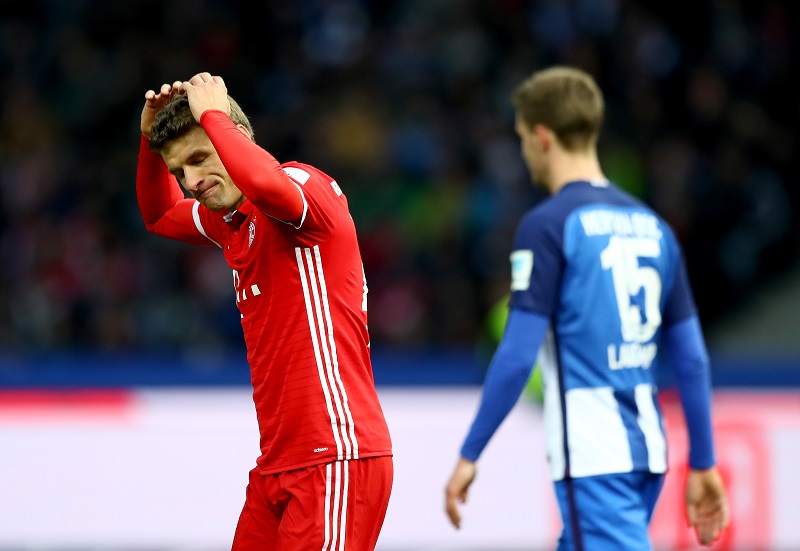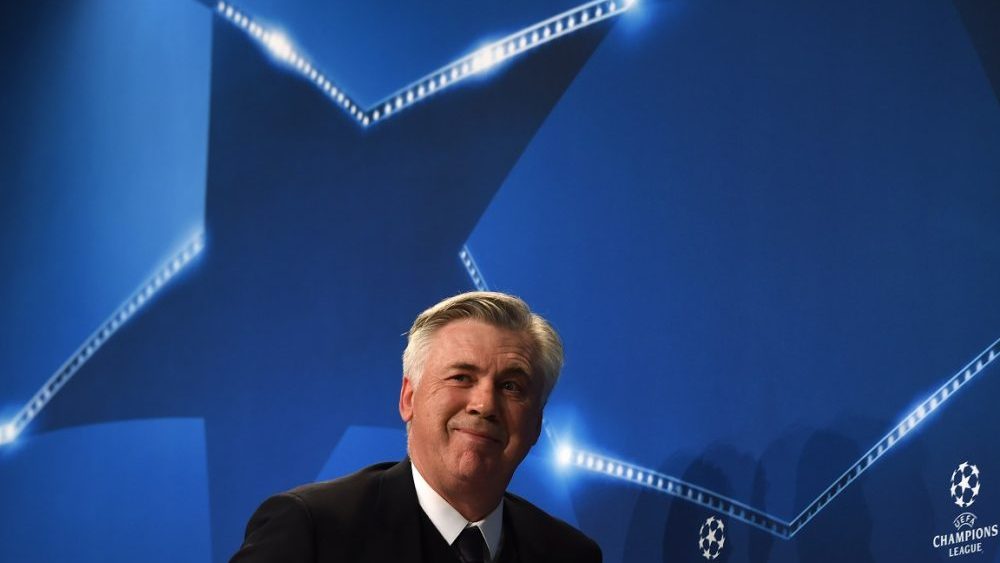Carlo Ancelotti: one step forward, two steps back?
The criticism has been re-evaluated, re-formulated, and adjusted, elsewhere as well as here in the blog. The development of the team, however, hasn’t changed much and the points of criticism have remained more or less the same. After our preview for the Hertha game, there were a number of critical comments in the German part of our site, focusing on our point of view and our skeptical outlook.
After all, Carlo Ancelotti isn’t just anyone. He’s won more than one title with his experience and exactly this way of playing before. But at the heart of our criticism is something completely different. Our commentary.
First press conference showed the way
When the Italian was presented in the summer, the expectations for Bayern were huge. The club had just won its fourth league title in a row and dominated the league throughout that period, and added three DFB Cups to the list, too. But the Champions League had remained just out of reach since 2013.
Looking at periods of dearth like that between 1976 to 2001, or 2001 and 2013, that’s not a long time at all. But the five-time winner developed an enormous appetite for success. Rarely, in the history of the club, has the team been so close to triumph, so many times in a row, only to make the decisive step just once.
Ancelotti is one of the few coaches who’ve managed to win the Champions League three times. This fact, of course, was prominent during his presentation. The Italian has always been known to be a pragmatic, calm, and unspectacular coach. He’s not known for developing teams, and often wasn’t very successful in league competitions.
From the very start, therefore, it was to be expected that full-time coach Guardiola would be replaced by a very different kind of manager. One who would put all of his focus on the end of the season, and would use his luxurious squad’s quality only sparingly before then. An approach like that can lead to the much coveted European title eventually, and it’s pointless to discuss its implications for short-term success.

(Photo: Guenter Schiffmann / AFP / Getty Images)
He’s done it before
Ancelotti’s AC Milan ended up third in the league in 2003, but won the Champions League. He managed to repeat this feat in 2007, with a European cup and a league finish in fourth. When he won his third Champions League title with Real Madrid in 2014, the team was third in the league once again – even though they were only three points behind the league winner.
And yet there’s one red thread shining through his coaching history so far: prepping the team for one single season climax. That is what clubs sign him on for, and that is what FC Bayern expect from him, too. The only time he ever managed to form an era was during his time at AC Milan, where he developed young, talented players like Pirlo and Kaká.
At the end of his time there, however, he – and the club’s leadership team – missed the right time for rebuilding the team, and left Italy. Ancelotti is not an innovative coach for the future, but rather the man that’s supposed to bring European glory back to Munich. No matter how. Asap.
Criticising the club, not the coach
This is what the Miasanrot team criticises. The club puts the Champions League title at a much higher priority than everything else and seems to have declared as its goal a golden finish to the last steps of a golden generation. Rebuilding the team can wait, and they found a coach who can achieve exactly that. But what comes next?
Young players like Kimmich or Coman, even Sanches, are left out. Ancelotti trusts seasoned players and cares about results more than anything else. Next summer, a radical change is inevitable. Kimmich is rumoured to be following in Lahm’s footsteps on the right, but hasn’t played in that position in a long time.
Coman’s situation is even more critical. The Frenchman hasn’t had a real chance to play since coming back from injury, and the option to turn his loan into a permanent contract hasn’t been used yet. It’s the opposite of trusting young players. Renato Sanches is showing big difficulties in playing, but they can’t be solved if a player isn’t even allowed time on the field with the team several points ahead in the league.
This strategy could have repercussions in the coming transfer period in the summer. Why would a young player decide for FC Bayern, considering the club’s current development? What perspective is there with a coach like Ancelotti, who obviously prefers experience?
The club is taking a very conscious step backward to potentially get its will in the end. What happens afterwards, though? Can this coach then start a new era? Can he successfully rebuild a team in a phase of turnover? His reputation suggests otherwise.
Falling back into old habits
It’s not just long-term success at stake, either – the short-term success he was signed on for might be in danger, too. Ancelotti’s team still needs to play away at Cologne, Gladbach, Hoffenheim, Leverkusen, Wolfsburg, and Leipzig. It’s a full-on schedule and the league title is far from won with the current five-point lead.
Despite adjusting his system to a 4-2-3-1, Ancelotti doesn’t manage to include all players well. He has managed to stabilise defense, compared to the season’s early stages, but when the team has the ball, build-up play often looks sluggish and unimaginative. Müller’s integration into the team has been as questionable as the pairings of players in midfield. The central defensive midfield that has worked best so far, Kimmich and Alonso, has hardly played together.

(Photo: Martin Rose / Bongarts / Getty Images)
Instead, the manager often trusts Alonso and Vidal, who seem to have a negative impact on each other. His substitutions during the game often impede the team’s flow, rather than improving it. But not all of the problems are exclusively Ancelotti’s.
The biggest factor is the ageing squad. Many players are past their prime, frequently injured, or simply in bad form after years of performing well. It would be too much to ask of Ancelotti to seamlessly continue Guardiola’s work. After all, the results are still as expected, and the German champions have had much worse transitional seasons in the past.
And yet, the regression in play is too big. The stand-out games against Leipzig and Arsenal were nice, but even the game against the English team showed that Bayern have difficulties right out of the box if they haven’t been able to build rhythm before. They only started delivering well in the second half – not enough at this level of play.
Ancelotti is experienced enough to have been through this situation before, and come out on top. In the near future, he will be (more or less) successful. In the end, the problem isn’t the lack of success, but the lack of development and a missing process that’s leading towards a team revamp.
The only way to justify these issues and the poor performances in the league will be continued success – especially in the Champions League, a competition more in focus for Ancelotti than any other Bayern coach before him. This primary goal seems to be hovering over everything else, even long-term planning; and that is regress into old habits.
Into times when Bayern was successful but didn’t play good football, and often relied on its players’ individual quality. Into times when Bayern’s way of playing often wasn’t fun to watch during the season, but at least lead to titles. Into times when the club wanted to show success at any cost and eventually vanished into European no-man’s-land after a brief period of accomplishment. A lack of transition was one of the reasons for that.
It’s similar this time. The club has missed its chance to use Guardiola’s work as foundation for a new identity. Carlo Ancelotti can bring short-term success, but even that is endangered at the moment. A long-term plan or development seem far away, with an executive team that has planned for the near-term on all levels. Looking ahead is cause for discomfort, therefore, rather than excitement. The club would be well-advised to work on a plan that goes beyond Cardiff on 3 June this year.









